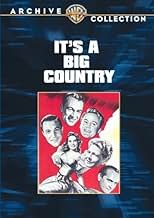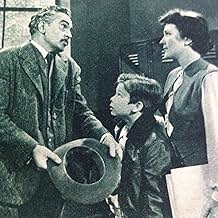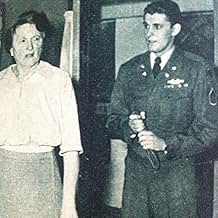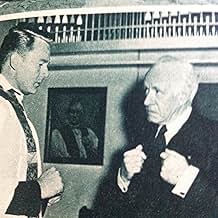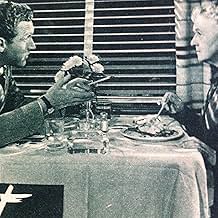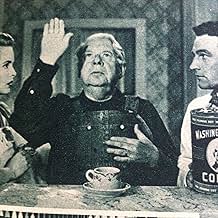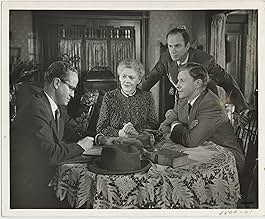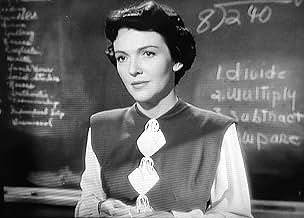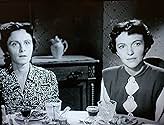Füge eine Handlung in deiner Sprache hinzuComprised of eight unrelated episodes of inconsistent quality, this anthology piece of American propaganda features some of MGM Studios' best directors, screenwriters and actors; it is narra... Alles lesenComprised of eight unrelated episodes of inconsistent quality, this anthology piece of American propaganda features some of MGM Studios' best directors, screenwriters and actors; it is narrated by Louis Calhern.Comprised of eight unrelated episodes of inconsistent quality, this anthology piece of American propaganda features some of MGM Studios' best directors, screenwriters and actors; it is narrated by Louis Calhern.
- Miss Coleman
- (as Nancy Davis)
- Joey Esposito
- (as Bobby Hyatt)
Empfohlene Bewertungen
Wellmann and co tell us that America is a big country ,with big differences but where everybody has his place in the sun: in the "celebrities" segment,there are plenty of black artists such as Armstrong ,but the civil rights were ignored in 1949.
What saves this naive film containing more finer feelings than a Capra movie,is some kind of humor .Take the first scene on a train and the last sentence of the baffled traveler or the Hungarian daddy who does not want his daughters to marry a Greek,cause we are "enemies" .How great the melting pot is!And so are Gene Kelly and Janet Leigh.
Some stars only appear a few minutes:Gary Cooper tells us what a wonderful state "Lone Star" Texas is where oil spurts out everywhere under your feet;Ethel Barrymore plays a delightful old lady who is cross cause she was not counted when they took a census of the population.
The last sketch ,about glasses ,was perhaps not a very good choice to conclude the movie.
It was,is and will always be a big country.
An opening segment on a train, that draws us into the whole thing, features James Whitmore as a patriotic, "I love America" type. "Which America?" asks the always-debonair and well-spoken William Powell. We then see the many sides of our country depicted through vignettes.
There are a couple of segments against prejudice. One is about a Greek-hating Hungarian American father of several girls (S. Z. Sakall) whose eldest daughter (Janet Leigh) falls for a young Greek American (Gene Kelly - actually pushing 40 at the time but you'd never guess it). As a piece against xenophobia, it's nice, and gets its point across with humor, wit, and romance.
There's also a segment against religious prejudice, where an ex-seviceman named Maxie Klein (Keefe Brasselle) visits the mother (Marjorie Main) of a dead war buddy. At first the mother doesn't know the man because her son had used his nickname in his letters. She's suspicious of his motives because he's Jewish. Eventually she's grateful for the comfort the stranger has given her, putting aside whatever prejudices she was harboring, and requesting his mother's address so that she can write her about it all.
The segments are all fairly interesting, but not exactly first-rate drama or comedy.
There's one about a minister (Van Johnson) who learns a lesson in humility from a deacon (played by Louis Stone). There's one in which Fredric March plays a working-class Italian American who won't be convinced by a schoolteacher (Nancy Davis) his son needs glasses. Gary Cooper plays a cowboy in a humorous monologue about Texas. Louis Calhern narrates a documentary sequence about African Americans. Ethel Barrymore and George Murphy star in a dramatic sketch wherein an old Boston-Irish woman is upset because the US Census ignored her. Etc.
The overall effect is a little like picking up an old copy of Reader's Digest.
Without the stars, this would be very minor, indeed. With them, it becomes a big film. Not a great film, but, undoubtedly, a big one. It covers a lot of ground, and comes up a little bit short.
Episodic by nature and all the vignettes have their charm but the first three are really the best.
William Powell and James Whitmore breeze their way through a lively discussion of the ever evolving nature of the country. Their reactions to each other are what makes the skit.
Next up is a little story about not being lost in the crowd made charming by Ethel Barrymore's gentle performance.
The next segment is a tribute to notable African Americans which is nice in and of itself but that's also why it's a bit problematic. Considering the time it was made the isolated state of the short would have made it easy to snip out in the South. Of course the same could be said for any of the stories but since their are not people of color in any of the other segments it's rather obvious that was the intention at the time. Still it's a nice opportunity to see the significant Americans it spotlights.
The other sections all showing various slices of life, aside from Gary Cooper's star bit simply representing Texas, are pleasant but are on the sticky side of sweet.
Directed by seven different directors and featuring an ensemble cast of both MGM contract actors and non contract players, this film portrays various stories and characters, each representing different aspects of American life as it existed in the 1950s. I won't go over every segment, but I will mention some that stood out and why.
In the segment concerning the Hungarian immigrant (S. Z. Sakall) who does not want his daughter to marry a Greek because Hungarians hate Greeks - Is that even true?
The third segment is different from the rest as it is a mini documentary concerning successful and prominent Black Americans. This is actually the best part of the film as it was very informative and progressive for its time.
The fifth segment about a Jewish soldier who has been to Korea visiting the mother of a dead comrade in arms seems like it might have originally been written concerning WWII soldiers.
The sixth segment has Gary Cooper as a Texan disputing Texas stereotypes by dispensing even more Texas stereotypes. Qualifications for this judgment - I am a Texan.
The seventh segment also seems like it might have been written for WWII. Van Johnson plays the minister in a church that the president attends when in Washington, and as a result he writes a bunch of dull wonky sermons about public policy that only the president could appreciate. The reason that I think that it was written for WWII is that Lewis Stone talks about how the president was missing if traveling or relaxing at Hyde Park, which is where Roosevelt lived. Also, at the end, when the president is going to come see Johnson's character, there is the distinct sound of crutches.
I liked the introductory segment the best because it had William Powell in it AND it had Powell, as a passenger on a train who puts an annoying know it all in his place. Powell is actually the reason I decided to watch this in the first place.
I would say the film as a whole is a tough slog unless you look at it in its historical context.
Wusstest du schon
- WissenswertesWhen she discovers that Icarus Xenophon (Gene Kelly) is Greek, Janet Leigh does a spot-on imitation of S.Z. "Cuddles" Sakall's (S.Z. Sakall) trademark response to upsetting news, placing her palms against her cheeks and emitting an exasperated "Sheeeesh!"
- PatzerWhen the census taker asks Ethel Barrymore her name, she replies "Mrs. Brian Patrick Riordan" and he writes it down. Always with censuses, a woman's given name is entered.
- Zitate
Rosa Szabo Xenophon: Marry me? You don't know anything about me.
Icarus Xenophon: You're a girl. You're pretty and you're modest. What else is there to know?
- VerbindungenEdited into A Letter from a Soldier (1951)
Top-Auswahl
- How long is It's a Big Country: An American Anthology?Powered by Alexa
Details
- Erscheinungsdatum
- Herkunftsland
- Sprachen
- Auch bekannt als
- Nueve vidas
- Drehorte
- 1772 Church Street NW, Washington, District of Columbia, USA(St. Thomas Episcopal Church - where Rev. Birch was assigned)
- Produktionsfirma
- Weitere beteiligte Unternehmen bei IMDbPro anzeigen
Box Office
- Budget
- 1.013.000 $ (geschätzt)
- Laufzeit1 Stunde 29 Minuten
- Farbe
- Seitenverhältnis
- 1.37 : 1
Zu dieser Seite beitragen


